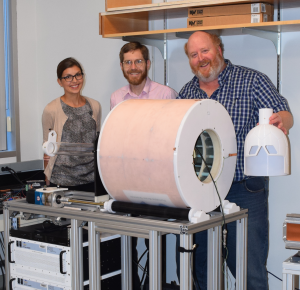
The team that created the portable MRI: Clarissa Cooley, Jason Stockmann and Larry Wald. (Photo courtesy of the Martinos Center)
MRI (Magnetic Resonance Imaging) is the gold standard for soft tissue imaging in the body, but the current hardware has a few drawbacks: scanners are gigantic, expensive, loud and require high power. All these factors make it so an MRI scanner can’t travel to a battlefield or to a patient in a remote location.
But a team at the MGH Martino center is developing a portable low-cost MRI scanner for human brain imaging. The prototype scanner can be wheeled into a patient’s room, plugged into a standard outlet and safely operated by a clinician at the patient’s bedside. How? First, instead of imaging the whole body, it only scans the patient’s head. Second, the researchers replaced the standard magnets with a compact permanent magnet that fits around the head mechanically rotates. Then they use complex algorithms to reconstruct the images.
Join Tell Me Something I Don’t Know in Boston for a show on Medicine. Side effects include extra kidneys, Lyme disease, hairlessness, cardiac arrest and magical mucus. Our panelists are:
Bapu Jena, Harvard economist, physician and professor, who knows something about Viagra and STDs.
Christine Hurley, Boston comedian, who lost about 30 pounds for each of her kids.
Evan Allen, head athletic trainer for the New England Revolution, who has a very brief history in soccer.
Our real-time fact-checker is Carey Goldberg, editor of WBUR‘s health blog CommonHealth.
Comments